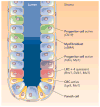Inflammation and stem cells in gastrointestinal carcinogenesis
- PMID: 19074742
- PMCID: PMC2705777
- DOI: 10.1152/physiol.00031.2008
Inflammation and stem cells in gastrointestinal carcinogenesis
Abstract
Chronic inflammation-induced carcinogenesis is a commonly accepted entity and is frequently seen within the gastrointestinal tract, although the underlying mechanisms remain unclear. Alterations in specific oncogenes and tumor suppressor genes are known to be responsible for malignant transformation. Nevertheless, the inflammatory microenvironment classically affects tumor promotion in its role as an altered stem cell niche and can also affect tumor initiation and tumor progression. The origin of the tumor cells is often attributed to stem cells, a unique subpopulation within tumors that possess the ability to initiate tumor growth and sustain self-renewal, as well as is largely responsible for their metastatic potential. Here, we review the link between inflammation and gastrointestinal carcinogenesis and the relationship between stem cells and cancer stem cells.
Figures


References
-
- Aractingi S, Kanitakis J, Euvrard S, Le Danff C, Peguillet I, Khosrotehrani K, Lantz O, Carosella ED. Skin carcinoma arising from donor cells in a kidney transplant recipient. Cancer Res. 2005;65:1755–1760. - PubMed
-
- Avital I, Moreira AL, Klimstra DS, Leversha M, Papadopoulos EB, Brennan M, Downey RJ. Donor-derived human bone marrow cells contribute to solid organ cancers developing after bone marrow transplantation. Stem Cells. 2007;25:2903–2909. - PubMed
-
- Balkwill F, Mantovani A. Inflammation and cancer: back to Virchow? Lancet. 2001;357:539–545. - PubMed
-
- Barker N, Clevers H. Tracking down the stem cells of the intestine: strategies to identify adult stem cells. Gastroenterology. 2007;133:1755–1760. - PubMed
Publication types
MeSH terms
Substances
Grants and funding
LinkOut - more resources
Full Text Sources
Medical

